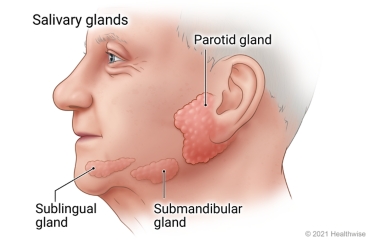Salivary Gland Stone: Care Instructions
Overview

Salivary glands make saliva, or spit. A salivary gland stone is a piece of hard material, usually calcium,
that can form in any of the three main salivary glands in the mouth. Salivary gland stones are also called
salivary duct stones. Stones form most often in the gland that releases saliva below the tongue.
A stone can block saliva from flowing out of the gland. When saliva backs up behind the stone, it can make
the gland swell. The gland swells while you are eating, and then the swelling goes down slowly afterward. The
swelling and pain may be under the jaw or in the area in front of the ear, depending on which gland is
affected.
Your doctor will ask you about your symptoms. Your doctor may be able to see and feel the gland under your
skin or in the floor of your mouth. You may get an imaging test, such as a CT scan or ultrasound. This will
help your doctor know if you have a stone and not some other problem.
Most stones come out into the mouth on their own. While the stone is in the gland, your doctor may have you
take medicine for pain. There are also some things you can do at home to help move the stone. If the stone in
your gland hasn't come out within a few weeks, your doctor will discuss treatment options with you.
Follow-up care is a key part of your treatment and safety. Be sure to make and go to all
appointments, and call your doctor if you are having problems. It's also a good idea to know your test results
and keep a list of the medicines you take.
How can you care for yourself at home?
-
Be safe with medicines. Read and follow all instructions on the label.
-
If the doctor gave you a prescription medicine for pain, take it as prescribed.
-
If you are not taking a prescription pain medicine, ask your doctor if you can take an
over-the-counter medicine.
-
If your doctor prescribed antibiotics, take them as directed. Do not stop taking them just because you
feel better. You need to take the full course of antibiotics.
-
Use sugar-free gum or candies such as lemon drops, or suck on a lemon wedge. They increase saliva, which
may help push the stone out.
-
Gently massage the affected gland to help move the stone.
When should you call for help?
 Call your
doctor now or seek immediate medical care if:
Call your
doctor now or seek immediate medical care if:
Watch closely for changes in your health, and be sure to contact your doctor if:
Current as of: September 27, 2023
Content Version: 14.0
Care instructions adapted under license by your
healthcare professional. If you have questions about a medical condition or this instruction, always ask
your healthcare professional. Healthwise, Incorporated disclaims any warranty or liability for your use of
this information.